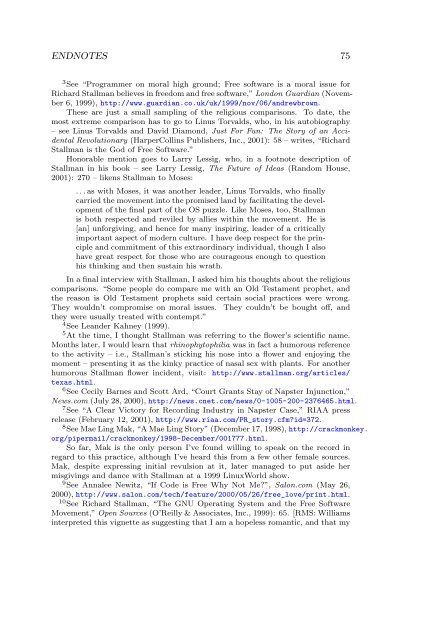Create successful ePaper yourself
Turn your PDF publications into a flip-book with our unique Google optimized e-Paper software.
ENDNOTES 75<br />
3 See “Programmer on moral high ground; Free software is a moral issue for<br />
Richard Stallman believes in freedom and free software,” London Guardian (November<br />
6, 1999), http://www.guardian.co.uk/uk/1999/nov/06/andrewbrown.<br />
These are just a small sampling of the religious comparisons. To date, the<br />
most extreme comparison has to go to Linus Torvalds, who, in his autobiography<br />
– see Linus Torvalds and David Diamond, Just For Fun: The Story of an Accidental<br />
Revolutionary (HarperCollins Publishers, Inc., 2001): 58 – writes, “Richard<br />
Stallman is the God of Free Software.”<br />
Honorable mention goes to Larry Lessig, who, in a footnote description of<br />
Stallman in his book – see Larry Lessig, The Future of Ideas (Random House,<br />
2001): 270 – likens Stallman to Moses:<br />
. . . as with Moses, it was another leader, Linus Torvalds, who finally<br />
carried the movement into the promised land by facilitating the development<br />
of the final part of the OS puzzle. Like Moses, too, Stallman<br />
is both respected and reviled by allies within the movement. He is<br />
[an] unforgiving, and hence for many inspiring, leader of a critically<br />
important aspect of modern culture. I have deep respect for the principle<br />
and commitment of this extraordinary individual, though I also<br />
have great respect for those who are courageous enough to question<br />
his thinking and then sustain his wrath.<br />
In a final interview with Stallman, I asked him his thoughts about the religious<br />
comparisons. “Some people do compare me with an Old Testament prophet, and<br />
the reason is Old Testament prophets said certain social practices were wrong.<br />
They wouldn’t compromise on moral issues. They couldn’t be bought off, and<br />
they were usually treated with contempt.”<br />
4 See Leander Kahney (1999).<br />
5 At the time, I thought Stallman was referring to the flower’s scientific name.<br />
Months later, I would learn that rhinophytophilia was in fact a humorous reference<br />
to the activity – i.e., Stallman’s sticking his nose into a flower and enjoying the<br />
moment – presenting it as the kinky practice of nasal sex with plants. For another<br />
humorous Stallman flower incident, visit: http://www.stallman.org/articles/<br />
texas.html.<br />
6 See Cecily Barnes and Scott Ard, “Court Grants Stay of Napster Injunction,”<br />
News.com (July 28, 2000), http://news.cnet.com/news/0-1005-200-2376465.html.<br />
7 See “A Clear Victory for Recording Industry in Napster Case,” RIAA press<br />
release (February 12, 2001), http://www.riaa.com/PR_story.cfm?id=372.<br />
8 See Mae Ling Mak, “A Mae Ling Story” (December 17, 1998), http://crackmonkey.<br />
org/pipermail/crackmonkey/1998-December/001777.html.<br />
So far, Mak is the only person I’ve found willing to speak on the record in<br />
regard to this practice, although I’ve heard this from a few other female sources.<br />
Mak, despite expressing initial revulsion at it, later managed to put aside her<br />
misgivings and dance with Stallman at a 1999 LinuxWorld show.<br />
9 See Annalee Newitz, “If Code is Free Why Not Me?”, Salon.com (May 26,<br />
2000), http://www.salon.com/tech/feature/2000/05/26/free_love/print.html.<br />
10 See Richard Stallman, “The GNU Operating System and the Free Software<br />
Movement,” Open Sources (O’Reilly & Associates, Inc., 1999): 65. [RMS: Williams<br />
interpreted this vignette as suggesting that I am a hopeless romantic, and that my


